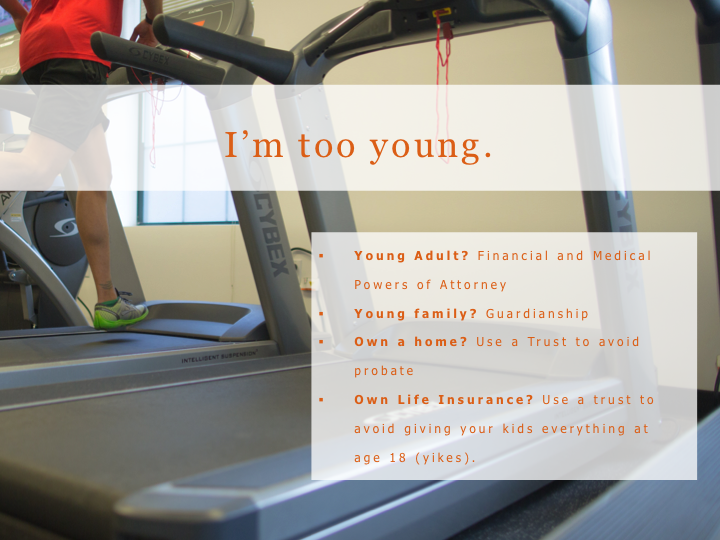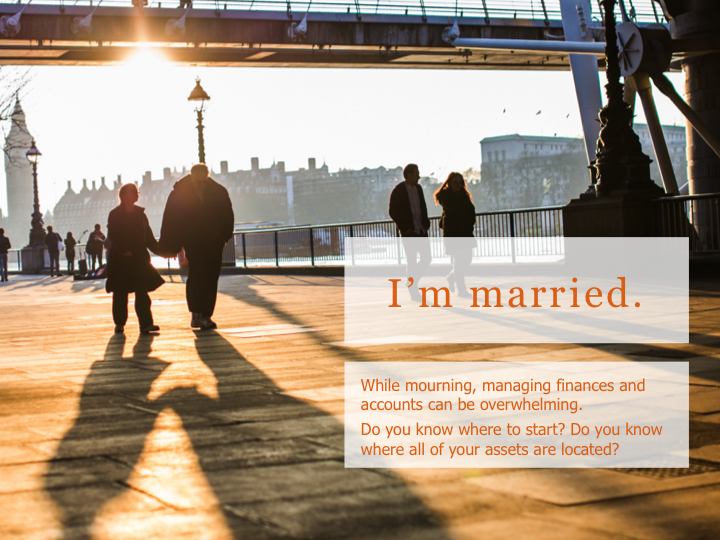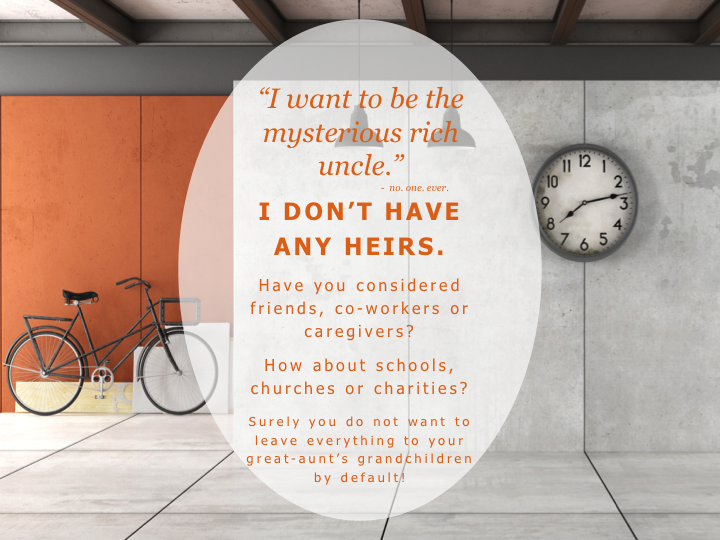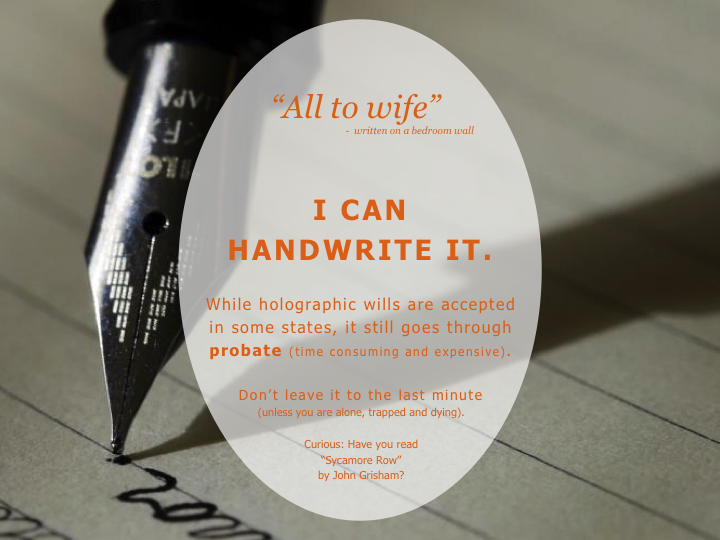Over the past few days, the local news has been filled with tragic accidents that have claimed the lives of young parents. From winter-related freeway fatalities to a small plane crash, each report makes me wonder if the families left behind have been protected with proper financial resources and estate planning. Sadly, most families are not. Last year a survey by Harris Poll conducted for Rocket Lawyer found that 64% of American adults do not have a will and 55% do not have any estate planning in place. Around 50% of those people indicated that they didn't need one or just hadn't gotten around to it. Excuses abound when considering estate planning, but the reality is that 100% of us are going to die at some point, we just don't know when. Estate planning, when paired with a proper financial plan, protects us (and our families) from the unknown and gives us peace of mind.
Here are some of the common excuses to procrastinate estate planning. If you see yourself in these excuses, it is time to do something about it.
1. I’m too young. You are never too young to have an estate plan. Young adults need an estate plan to provide financial and medical power of attorney responsibilities. At 18, mom and dad can no longer legally step in. Young families need estate planning to provide guardianship and asset management/distribution for minor children. Just bought your first house? Put it in a trust to avoid probate issues. Finally have life insurance? Use a trust to avoid your kids getting the pay off at 18. It is never too early to have an estate plan and a good estate plan that is regularly updated will last a lifetime.
2. I don’t have enough money or assets. Whether you are worth $10,000 or $5 million, estate planning issues and conflicts are the same. (Often they are worse with a smaller estate). If you own a home and/or have life insurance, both will be sizeable assets that need to be distributed. Real estate will likely go through probate if not properly titled in a trust. Boiled down, estate planning is just a fancy way of saying what happens to your stuff (house, assets, kids) when you pass away and who is responsible to make it happen. Everyone needs help with that. Everyone. Doing nothing just causes problems in the long run.
3. I’m married. It’s common to think that your spouse will take care of everything when you are gone. However, when a spouse dies the surviving spouse is left to deal with many loose ends. On top of mourning and grief, managing finances and assets can be overwhelming. Does your spouse know where all of the assets are located? How will they know where to start? A good estate plan will list assets and financial institutions to act as a guide to help the surviving spouse sort everything out. If you need a not-so-good example, read this post.
4. I’m single. If something happened to you today, what would happen? If you are incapacitated, who would keep paying your bills while you recover? Who would make medical decisions for you? Legally your parents are no longer allowed to step in – and would you want them to? If you suddenly died, who knows where you bank and how to access your accounts? Who knows where you have life insurance? Who could settle your estate – and yes, you have an estate. Single people often need an estate plan even more than married people because there isn’t an automatic person who can step in and take over.
5. I don’t have any heirs. If you are in a situation where you do not have any children, siblings or other close family members, you should have an estate plan in place. This provides an opportunity to look outside the normal family parameters and show how much you care for others in your life. Consider friends, co-workers, care-givers or look to schools, churches or charitable organizations that support your values. Without an estate plan in place, your assets could end up going to your great-aunt’s grandchildren that you have never met. While we all wish for that mysterious rich uncle to miraculously appear, do you really want to be the mysterious rich uncle?
6. I can’t decide. Most of our clients come to a point in their estate planning where they get stuck. Most often it is regarding guardianship for minor children, but sometimes it concerns Successor Trustees or Power of Attorney responsibilities. The best decision is to make a decision. Who is the best fit this year? It can always be changed in the future. It’s better that you make a decision than leave it up to chance.
7. I have a will. A will on it’s own is helpful in determining an executor for the estate, guardianship for minor children and distributing assets. The downside to a will is that it will go through the time consuming and expensive probate process. In addition, minor children will receive all assets at age 18. Depending on how responsible your beneficiaries are, this could be a recipe for disaster.
8. I can handwrite it. Some states recognize holographic (handwritten) wills and provided they meet minimum requirements, allow the will to be probated. Holographic wills are not recommended, but are often created in emergency situations when a testator is alone, trapped and near death. Yes, you can handwrite it, but it may not be best to leave it to the last minute and it will still go through probate.
9. I don’t care if my estate goes to probate. You may not care if your estate goes to probate, but the people left to settle your affairs will care – a lot! Probate is the ultimate loss of control. Your assets end up in the hands of the government and attorneys. Sound fun? In addition, probate is expensive and time consuming, taking anywhere from 6 months to several years and costing 3-10% of the total estate value.
10. I need a lawyer. Did you know that estate planning documents are template based and are completed by “filling in the blank” with a little customization? If you have a straightforward financial situation and simply need to get your assets to the right people in the most efficient way possible, you can bypass an attorney and look at other alternatives. The paperwork is exactly the same. As long as it is notarized and witnessed in the correct places, you will have the same legal documents that an attorney would prepare. Easy Legal Planning provides comprehensive, state-specific estate planning documents with specific instructions to assist you in making the documents legal and in funding your trust. It is a great fit for the majority of people. However, there are some situations that benefit from having a local attorney to assist with an estate plan. If you feel your estate plan is overly complicated, consult a local attorney.
11. It’s expensive. Estate planning can be expensive. When prepared by an attorney, a comprehensive estate plan that includes a living trust averages between $1500-$3500 and goes up from there. That is a lot of money for a suite of documents that are relatively “fill in the blank” and template-based. Online DIY alternatives are much less expensive but offer very little assistance when you have questions and are automated to spit out exactly what you put in – whether it is right or wrong. Easy Legal Planning offers a hybrid experience with live assistance available to answer questions and explain the documents included in your estate planning package. Estate plans that include a living trust are a fraction of the cost of an attorney and include real people preparing your documents.
12. I already have an estate plan. This may be the most plausible excuse, but before you pat yourself on the back, think about the last time you looked at your estate plan. There are two issues you need to address regularly: people and assets. It is possible that the people you named in your documents may not be the best fit for their responsibilities. Death, disability, divorce and life circumstances may mean you need to make some changes. Review your assets and make sure your trust is properly funded. Over time as you add new assets, you may forget to include them in your trust. Make sure real estate is titled in the name of your trust and accounts have the correct beneficiary designations. Before you think you are in the clear, take a look at your documents and make sure everything is up to date and funded properly.
You don't have to look far to see examples of people and families who needed a proper financial and estate plan. Excuses and procrastination are easy, but devastating when emergencies occur. Consult a financial professional to make sure your family is prepared for the future and pair your financial plan with an estate plan that will take care of you no matter what life throws at you. Easy Legal Planning is the easy way to get eliminate excuses and procrastination when it comes to estate planning.














